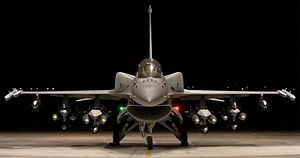The United States is moving forward with an $8 billion sale of up to 66 F-16V fighter jets to Taiwan, drawing praise from politicians in Taipei as President Tsai Ing-wen heads into a battle for re-election against Kaohsiung mayor Han Kuo-yu.
Tsai thanked the United States earlier this week for allowing the move to sell the Lockheed Martin F-16 Fighting Falcon Viper (V) Block 70 jets to Taiwan. President Donald Trump gave the arms sale his approval on Sunday, and the U.S. Department of State approved the deal on Tuesday. The sale must now be approved by the U.S. Congress and could be announced as early as next month.
The arms sale is the fifth to be approved since Trump took office in January 2017. Tsai said on Tuesday the previous sales were proof of the United States’ “long-standing commitment to helping maintain peace and stability in the Taiwan Strait.”
Tsai said earlier the fighter jets will enhance Taiwan’s defense capabilities. Along with the new F-16V jets, Taiwan is upgrading its existing fleet of 144 F-16 aircraft to the F-16V configuration, including the installation of Active Electronically Scanned Array radars used by U.S. F-35 stealth fighters.
The sale marks the beginning of a “new air force” for Taiwan, Tsai said on Wednesday. The United States last sold fighter jets to Taiwan in 1992.
Joseph Wu, Taiwan’s foreign minister, tweeted on Tuesday that the arms sale is “a vote of confidence in Taiwan-US relations and will help us maintain cross-strait peace and defend our democracy.”
The deal comes as China’s military continues to conduct frequent military exercises in the Taiwan Strait, including sending its own fighter jets into the periphery of Taiwanese air space. China’s People’s Liberation Army (PLA) held exercises in the Taiwan Strait earlier this month. In April, Tsai vowed the “forceful expulsion” of PLA fighters that stray into Taiwan’s airspace after two Shenyang J-11 fighters crossed the median line in the Taiwan Strait.
China has responded to the latest arms sale by threatening sanctions on the firms involved in the deal. Foreign ministry spokesman Geng Shuang urged the United States to stop all arms sales with Taiwan, while a military official told the South China Morning Post the acquisition would be “useless” in defending against a potential Chinese use of force.
Observers are split on the utility of the F16-V deal for Taiwan, whose fleet of modern jets remains vastly outnumbered by that of China. But the sale, along with the plans to extensively upgrade Taiwan’s existing F-16 fleet, could significantly raise the potential costs faced by China should it pursue the use of military force.
United States arms sales tend to receive a mixture of appreciation and skepticism in Taiwan. While some criticize their high price tags, others note that while Taiwan recently raised its defense budget, it has not yet reached the 3 percent of GDP that Tsai envisioned after taking office in May 2016.
Military spending has been a point of contention between Tsai Ing-wen, who is seeking re-election as the Democratic Progressive Party (DPP) presidential candidate, and Han Kuo-yu, the Kuomintang (KMT) nominee. In April, Han compared Taiwan’s military to “eunuchs draped in Western suits” due to its “lack of laws” and said increasing the military budget would thus be pointless. Tsai urged Han to retract his statement.
Han has been criticized for his friendliness to warmer ties with Beijing. While the mayor has said he staunchly opposes Beijing’s “one country, two systems” framework for Taiwan, he is supportive of increased engagement with China and has been silent on the ongoing protests in Hong Kong.
Han’s camp, however, released a statement on Monday saying: “The KMT presidential candidate Han Kuo-yu applauds President Donald Trump’s decision to approve the sale of new F-16 fighters to Taiwan. If elected president, Han pledges to deepen U.S.-Taiwan security and military relationships and make Taiwan a robust peace defender.”
Han met with American Institute in Taiwan (AIT) director Brent Christensen on Tuesday, although the mayor said he did not discuss the arms deal with the United States. Han has also said he is planning to visit the United States this autumn in what would be an attempt to foment goodwill in the country – a task with which the party has long struggled, in marked contrast to the DPP, which maintains a mission in Washington and has an extensive network in the United States.
Tsai and the DPP have rebounded from a KMT rout in last November’s regional elections by pledging their commitment to Taiwan’s sovereignty, including the strength of Taiwan-U.S. ties. Han, thus far, is choosing not to challenge the incumbent on what remains her most popular policy platform.













